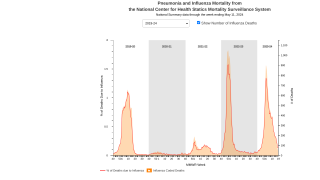Nasal Flu Vaccine Clinical Study Launched

A limited nasal influenza vaccine clinical trial has been launched by the National Institutes of Health (NIH).
This is a Phase I double-blind, randomized, placebo-controlled study in 50 healthy adolescents aged between 9- to 17-year-old, designed to assess the safety and immunogenicity of a prime-boost regimen of H3N2 M2SR intranasal influenza vaccine followed by licensed inactivated Quadrivalent Influenza Vaccine (QIV) boost administered intramuscularly.
The H3N2 M2SR intranasal influenza vaccine candidate is manufactured by FluGen, Inc. H3N2 M2SR is made from a strain of seasonal influenza virus (H3N2) that has been genetically designed to replicate only once in the body.
Clinical investigators hypothesize that volunteers who receive this candidate vaccine will have a robust immune response not only against H3N2 strains that match those in the vaccine but also against influenza strains that are mismatched to the vaccine strain.
Previous studies in animals showed that the “single replication” virus does not cause disease, but nevertheless prompted a robust immune response akin to that of a natural influenza infection.
Annual vaccination against influenza is recommended for everyone over six months of age, says the Centers for Disease Control and Prevention (CDC).
However, because the flu virus changes from year to year, vaccines must be reformulated annually to take account of those changes. When mismatches occur, vaccine effectiveness may suffer.
“We are hopeful that newer kinds of influenza vaccines, such as the candidate being tested in this trial, will provide protection even if their components do not precisely match the currently circulating influenza virus strains,” said NIAID Director Anthony S. Fauci, M.D.
The principal investigator Daniel Hoft, M.D., Ph.D., leads this clinical trial. This study is being conducted at a Vaccine and Treatment Evaluation Unit (VTEU) site funded by the National Institute of Allergy and Infectious Diseases (NIAID), part of the National Institutes of Health. The VTEUs are funded by NIAID through contract number HHSN272201300021.
About the National Institutes of Health (NIH): NIH, the nation's medical research agency, includes 27 Institutes and Centers and is a component of the U.S. Department of Health and Human Services. For more information about NIH and its programs, visit www.nih.gov, and other NIAID-related materials are available on the NIAID website.
Previously, the FluMist Quadrivalent live attenuated influenza vaccine (LAIV4) became an approved vaccination option for the 2018-19 flu season, according to the CDC Advisory Committee on Immunization Practices (ACIP).
This ACIP approval is a change from the last 2 seasons.
When FluMist is released to pharmacies in the USA, vaccination appointments can be scheduled by visiting this page.
The CDC Vaccine Price List provides the private sector prices for general information. Flu vaccine discounts can be found here.
Flu vaccines, like any medicine, can have side effects. You are encouraged to report negative side effects of vaccines to the FDA or CDC.
Our Trust Standards: Medical Advisory Committee

























